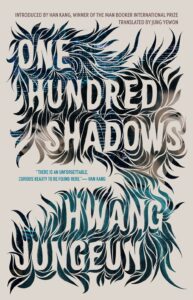
This review is based on an eARC (Advance Reading Copy) provided by the publisher via NetGalley in exchange for an honest review. One Hundred Shadows will be released on August 20, 2024.
Scrolling through the sci-fi/fantasy section of NetGalley puts a lot of books in front of me that aren’t necessarily part of my usual niches. Occasionally, those books are still intriguing enough to try out. In the case of One Hundred Shadows by Hwang Juengun, translated by Jung Yewon, the combination of acclaim in the original language, my previous enjoyment of other translations published by Erewhon, and the unintimidating novella length pushed me to give it a try.
One Hundred Shadows is firmly within the realm of literary fiction and magical realism, opening with the main character’s shadow detaching—something we are assured is dangerous and has led to death in many other cases—before moving into a story that’s much more about the uncertainty of the leads working in electronics shops in a building slated for demolition. There’s a bit of romance, a bit of slice-of-life, a bit of commentary on the way new urban developments can leave the marginalized scrambling for answers, and yes, a bit of magic.
One Hundred Shadows follows what I’m told to be a recent litfic trend of eschewing quotation marks and leaving dialogue tags to a minimum, which can make extended conversations disorienting, especially for a reader not familiar with Korean naming conventions who may have extra difficulty remembering which character is which. But the story still generates a haunting, somber mood, with so many unsettling stories about shadows lurking in the background and the specter of redevelopment lingering over the principal characters.
But while it’s clear that this is a story with something to say about the people whose fates are ignored by the developers seeking to tear down their workplaces, it’s not really a story with a clear narrative arc. Instead, it flits in and out of small moments in the characters’ lives, their walks and lunches together, their swapping of urban legends and stories about neighbors and relatives, and even some musings from the owners of the little shops that had become neighborhood institutions but are slated for destruction. Without a doubt, the big events color the individual moments, so it’s always clear just how the people on the ground are affected. And these small scenes are all well-written and engaging in their own right, and there is enough cohesion to see how the characters change over the course of the story.
And yet, despite the shadows and the impending destruction of the complex where the characters work, these small slices of life feel a bit disjointed, touching on the same topics but not really feeling unified by them. Perhaps the most unifying feature—at least from a plot perspective—is a slow-burn romance between the leads, but even that feels like a subplot and not like the point of the novella. Instead of any main plot arc, it’s a story that invites the reader to sample these mundane parts of everyday life, reflecting on the lives of ordinary people and how those lives are changed by city-planning decisions over which they have no control.
And while I tend to like ordinary people stories, and I certainly don’t mind theme-heavy stories, I felt myself wanting a little more to tie it together. The pieces are all there, with engaging scenes and a compelling and thought-provoking overall theme, but it felt less like a story and more like little pieces of story held together by theme and mood. I’m not a regular litfic reader, so maybe that’s the sort of story that will hit hard for readers accustomed to that sort of structure. But for me, it just needed a bit more cohesion.
Recommended if you like: slice-of-life, literary fiction, theme-driven stories.
Can I use it for Bingo? It features Reference Materials and has a POC Author and an Indie Publisher.
Overall rating: 13 of Tar Vol’s 20. Three stars on Goodreads.
